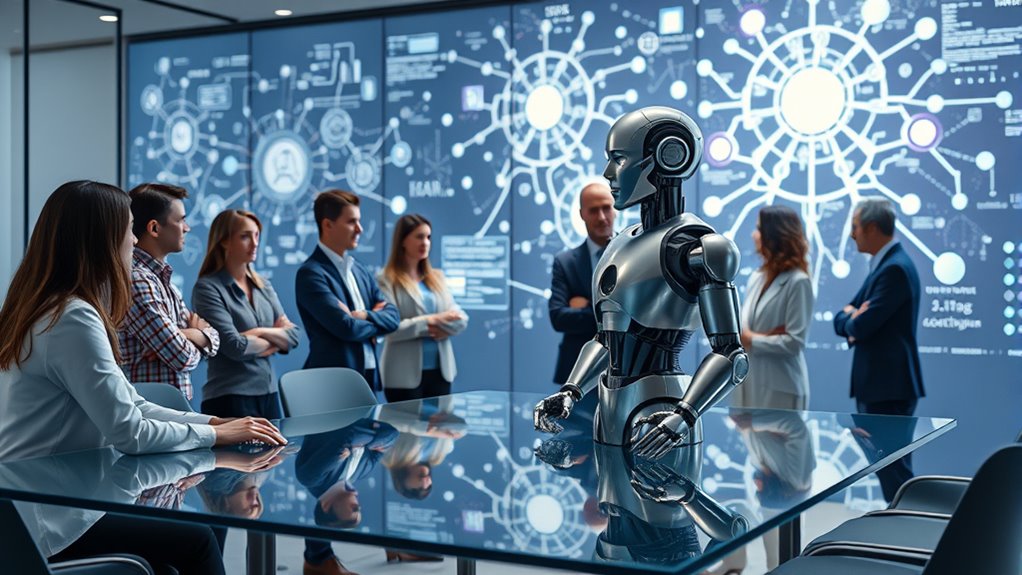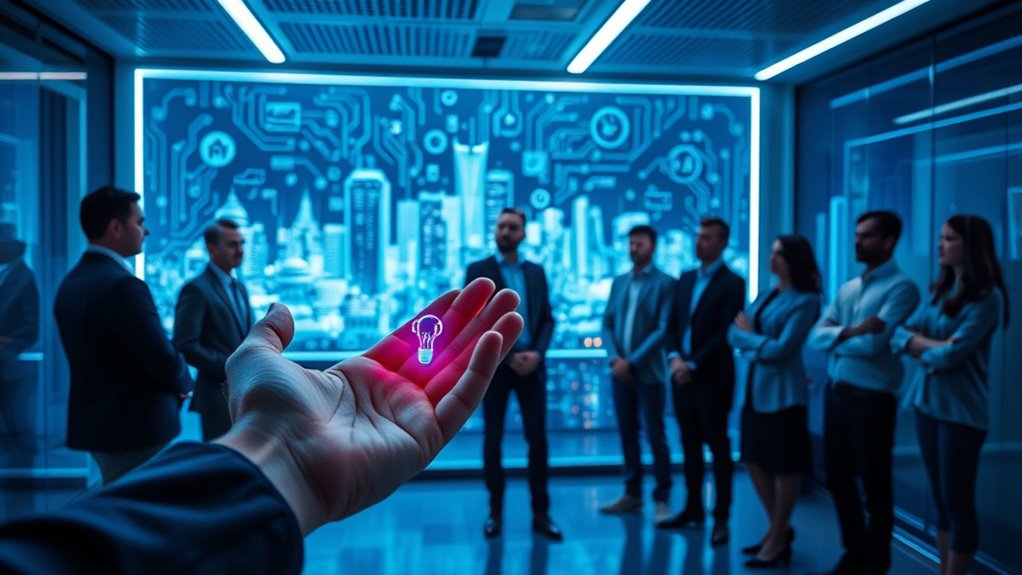To prepare for an automated future, you need to stay informed about AI’s impact on your industry and develop new skills that complement automation, such as critical thinking and emotional intelligence. Embrace change by continuously learning and adapting your roles to work alongside AI tools, rather than compete with them. Cultivating flexibility and a growth mindset will help you remain relevant. If you want to understand how to navigate this evolving landscape more effectively, keep exploring the strategies that can future-proof your career.
Key Takeaways
- Stay informed about AI advancements and industry trends through professional development and ongoing learning.
- Develop skills in critical thinking, emotional intelligence, and adaptability to complement AI automation.
- Embrace continuous training and online courses to acquire new competencies aligned with evolving technologies.
- Focus on evolving roles that leverage AI tools rather than competing against automation.
- Cultivate a flexible mindset to proactively adapt to technological changes and shape your career future.

Artificial intelligence is transforming the job market at a rapid pace, reshaping how work is done across industries. One of the most significant drivers of this change is machine learning, a subset of AI that enables systems to learn from data and improve over time without being explicitly programmed. As machine learning algorithms become more advanced, they automate tasks that were once performed solely by humans, from data analysis to customer service. This shift demands that you, as part of the workforce, adapt quickly to stay relevant. Workforce adaptation involves acquiring new skills, embracing continuous learning, and staying open to evolving roles that leverage AI tools rather than compete against them.
In this new landscape, understanding how machine learning impacts your field is vital. For example, if you’re in finance, AI can analyze vast amounts of data faster than any human, helping you make more informed decisions. If you work in manufacturing, automated systems powered by machine learning can streamline production lines, reduce errors, and increase efficiency. Recognizing these trends allows you to identify where your skills might need sharpening or where new expertise is required. The key is to view AI not as a threat but as an opportunity to enhance your productivity and broaden your professional capabilities.
Workforce adaptation isn’t just about learning technical skills; it also involves cultivating a mindset that embraces change. You need to become comfortable with the idea that some tasks will be automated and that your role may shift to focus more on oversight, strategy, or creative problem-solving. Companies are increasingly valuing skills like critical thinking, emotional intelligence, and adaptability—traits that machines can’t replicate. By investing in training programs or online courses, you can develop a better understanding of AI and machine learning applications relevant to your job. This proactive approach will position you as a valuable asset in an AI-driven workplace.
Furthermore, staying informed about industry developments related to AI will help you anticipate future changes. Engage with professional communities, attend workshops, and read up on the latest AI advancements. Doing so makes it easier to identify emerging opportunities and adapt your skillset accordingly. Additionally, understanding AI detection methods can help you navigate the ethical and authenticity concerns that come with AI-generated content. Remember, workforce adaptation is a continuous process, not a one-time effort. The more flexible and receptive you are to learning new tools and techniques, the better you’ll be prepared to thrive amid automation. Embracing this mindset guarantees you’re not left behind as AI reshapes the job landscape, but instead, you become an active participant in shaping your career’s future.
Frequently Asked Questions
How Will AI Impact Gig Economy Jobs?
AI will transform gig economy jobs by automating routine tasks, making some roles more efficient, but also increasing automation risks. You’ll need to stay informed about AI ethics to guarantee fair treatment and avoid bias. While AI can create new opportunities, it might also threaten certain gigs. Embrace continuous learning and adapt your skills to navigate these changes, ensuring you remain valuable in an increasingly automated landscape.
What Skills Are Most Resistant to Automation?
You’re standing on solid ground when it comes to skills resistant to automation. Emotional intelligence and creative problem solving are your best bets; they can’t be replaced by machines. Think of it as a wild card in a game—these skills let you connect, empathize, and innovate in ways AI can’t mimic. Cultivating these abilities keeps you one step ahead and ready for what’s next in the workforce.
How Can Educators Prepare Students for Ai-Driven Workplaces?
You can prepare students for AI-driven workplaces by integrating ethical considerations into your curriculum, ensuring they understand AI’s societal impact. Focus on teaching critical thinking, creativity, and emotional intelligence—skills that machines can’t replicate. Encourage project-based learning that emphasizes real-world problem-solving. By doing so, you help students develop adaptable skills and ethical awareness, making them better equipped for future jobs where human-AI collaboration is essential.
Will AI Create More Jobs Than It Displaces?
You might think AI will create more jobs, but in reality, it often accelerates job polarization, leaving some workers behind. Ironically, as AI ethics become essential, new opportunities emerge for those who adapt, yet many face displacement. So, while AI can generate new roles, the overall impact depends on how society manages ethical concerns and supports displaced workers, making the future uncertain and ironically more divided.
How Can Policymakers Support Workers During AI Transitions?
Policymakers can support workers during AI shifts by investing in worker retraining programs and strengthening social safety nets. You should advocate for accessible education and skill development initiatives that help workers adapt to new technologies. Additionally, expanding unemployment benefits and other safety measures guarantees financial stability. Together, these strategies help ease transitions, making it easier for workers to find new opportunities and thrive in an automated economy.
Conclusion
As AI continues to reshape the job landscape, your future depends on how quickly you adapt. Will you embrace the new opportunities or be left behind? The next move is yours—upskilling, learning, evolving. The horizon is uncertain, but one thing’s clear: those who act now will shape the automated world ahead. Are you ready to take the leap before it’s too late? The choice is yours, and the future is waiting.










